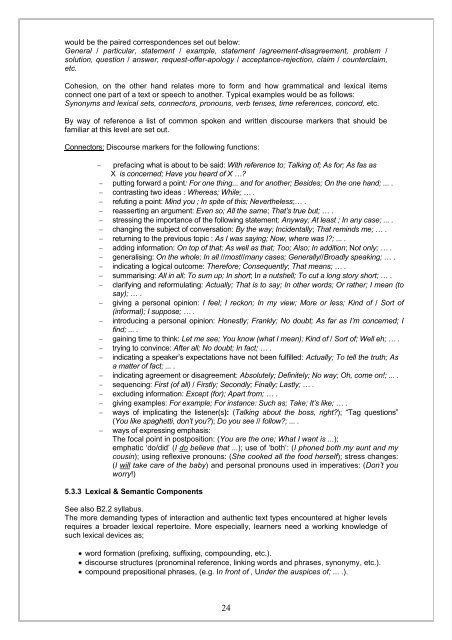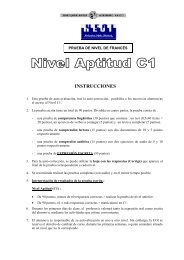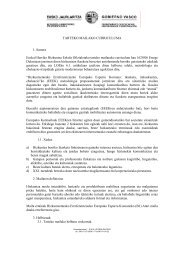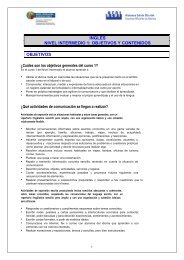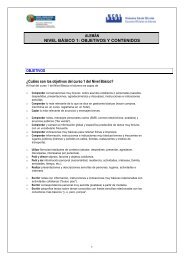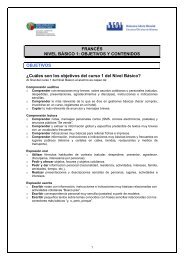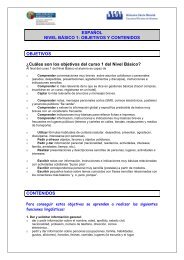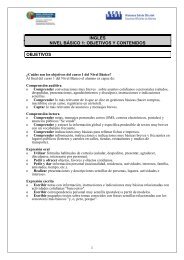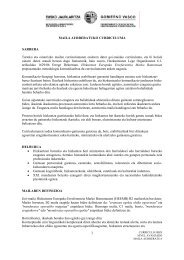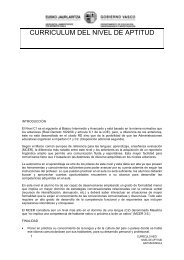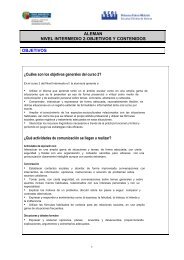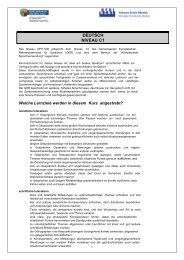C1 – Course Syllabus - Escuelas Oficiales de Idiomas del País Vasco
C1 – Course Syllabus - Escuelas Oficiales de Idiomas del País Vasco
C1 – Course Syllabus - Escuelas Oficiales de Idiomas del País Vasco
You also want an ePaper? Increase the reach of your titles
YUMPU automatically turns print PDFs into web optimized ePapers that Google loves.
would be the paired correspon<strong>de</strong>nces set out below:<br />
General / particular, statement / example, statement /agreement-disagreement, problem /<br />
solution, question / answer, request-offer-apology / acceptance-rejection, claim / counterclaim,<br />
etc.<br />
Cohesion, on the other hand relates more to form and how grammatical and lexical items<br />
connect one part of a text or speech to another. Typical examples would be as follows:<br />
Synonyms and lexical sets, connectors, pronouns, verb tenses, time references, concord, etc.<br />
By way of reference a list of common spoken and written discourse markers that should be<br />
familiar at this level are set out.<br />
Connectors: Discourse markers for the following functions:<br />
prefacing what is about to be said: With reference to; Talking of; As for; As fas as<br />
X is concerned; Have you heard of X …?<br />
putting forward a point: For one thing... and for another; Besi<strong>de</strong>s; On the one hand; ... .<br />
contrasting two i<strong>de</strong>as : Whereas; While; … .<br />
refuting a point: Mind you ; In spite of this; Nevertheless;… .<br />
reasserting an argument: Even so; All the same; That‟s true but; … .<br />
stressing the importance of the following statement: Anyway; At least ; In any case; ... .<br />
changing the subject of conversation: By the way; Inci<strong>de</strong>ntally; That reminds me; … .<br />
returning to the previous topic : As I was saying; Now, where was I?; ... .<br />
adding information: On top of that; As well as that; Too; Also; In addition; Not only; … .<br />
generalising: On the whole; In all //most//many cases; Generally//Broadly speaking; … .<br />
indicating a logical outcome: Therefore; Consequently; That means; … .<br />
summarising: All in all; To sum up; In short; In a nutshell; To cut a long story short; … .<br />
clarifying and reformulating: Actually; That is to say; In other words; Or rather; I mean (to<br />
say); … .<br />
giving a personal opinion: I feel; I reckon; In my view; More or less; Kind of / Sort of<br />
(informal); I suppose; … .<br />
introducing a personal opinion: Honestly; Frankly; No doubt; As far as I‟m concerned; I<br />
find; ... .<br />
gaining time to think: Let me see; You know (what I mean); Kind of / Sort of; Well eh; … .<br />
trying to convince: After all; No doubt; In fact; … .<br />
indicating a speaker‟s expectations have not been fulfilled: Actually; To tell the truth; As<br />
a matter of fact; ... .<br />
indicating agreement or disagreement: Absolutely; Definitely; No way; Oh, come on!; ... .<br />
sequencing: First (of all) / Firstly; Secondly; Finally; Lastly; … .<br />
excluding information: Except (for); Apart from; … .<br />
giving examples: For example; For instance: Such as; Take; It‟s like; … .<br />
ways of implicating the listener(s): (Talking about the boss, right?); “Tag questions”<br />
(You like spaghetti, don‟t you?); Do you see // follow?; ... .<br />
ways of expressing emphasis:<br />
The focal point in postposition: (You are the one; What I want is ...);<br />
emphatic „do/did‟ (I do believe that ...); use of „both‟: (I phoned both my aunt and my<br />
cousin); using reflexive pronouns: (She cooked all the food herself); stress changes:<br />
(I will take care of the baby) and personal pronouns used in imperatives: (Don‟t you<br />
worry!)<br />
5.3.3 Lexical & Semantic Components<br />
See also B2.2 syllabus.<br />
The more <strong>de</strong>manding types of interaction and authentic text types encountered at higher levels<br />
requires a broa<strong>de</strong>r lexical repertoire. More especially, learners need a working knowledge of<br />
such lexical <strong>de</strong>vices as;<br />
word formation (prefixing, suffixing, compounding, etc.).<br />
discourse structures (pronominal reference, linking words and phrases, synonymy, etc.).<br />
compound prepositional phrases, (e.g. In front of , Un<strong>de</strong>r the auspices of; ... .).<br />
24


